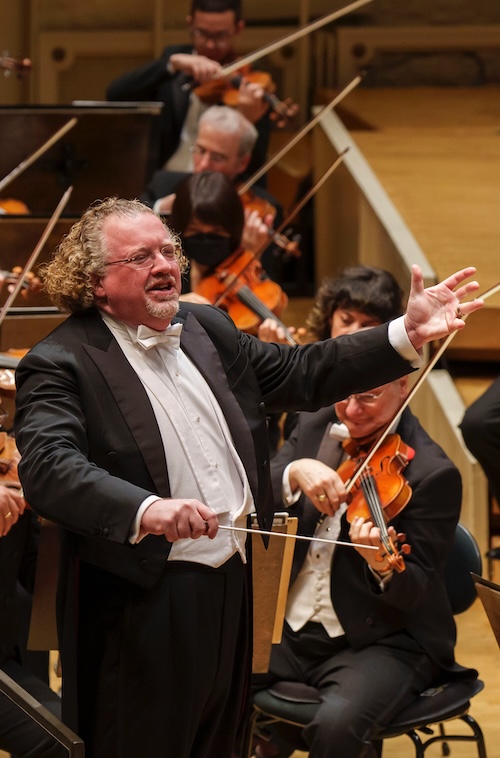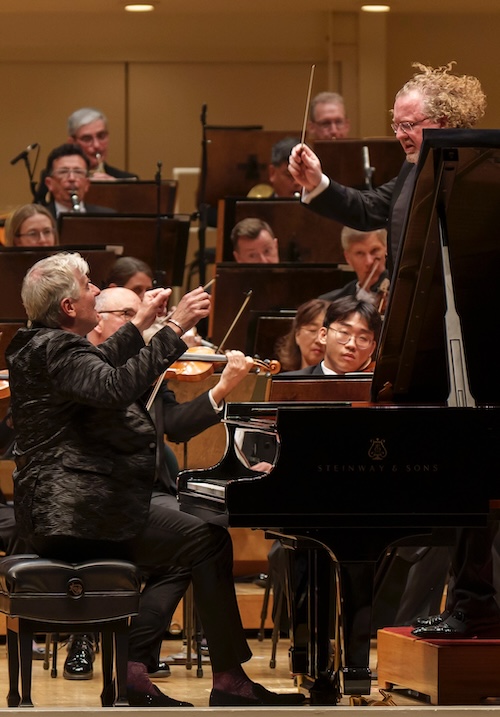French rarities shine brilliantly with Denève, Thibaudet and CSO

Few national musics have been as neglected at Orchestra Hall over the past decade as that of French composers.
This week’s Chicago Symphony Orchestra concerts are helping to aright the balance with Stéphane Denève leading a Gallic program Thursday night that gracefully mixed the familiar (Bolero) with less frequently heard works inspired by non-French locales.
Music director of the St. Louis Symphony Orchestra since 2019, Denève took the reins of the New World Symphony last fall, succeeding Michael Tilson Thomas, the founding artistic director of the Miami Beach orchestral academy.
In his first CSO stand in 11 seasons, Denève brought the same incisive direction, textural transparency and French esprit as he has to past performances.
The concert led off with D’un matin de printemps (Of a Spring Morning) by Lili Boulanger, the prodigiously talented yet physically fragile younger sister of the famous pedagogue Nadia. D’un matin is more traditional than many of Boulanger’s startlingly original works, yet Denève led a vibrant, flowing performance that brought out the miniature’s lyric charm. One can only imagine the musical riches lost to history by Lili Boulanger’s early death at 24.
There is no greater exponent of French keyboard repertoire currently before the public than Jean-Yves Thibaudet, as the pianist showed once again in his performance of Camille Saint-Saëns’ Piano Concerto No. 5, the “Egyptian.”
While Saint-Saëns’ once-popular Second Piano Concerto seems to have fallen out of the regular repertoire, all five of Saint-Saëns’ keyboard concertos are of high quality and deserve to be played more often than they are.
The Fifth Concerto may not explore great existential depths but not everything has to be Winterreise. Composed in Luxor in 1896, the “Egyptian” inspiration that gives the work its title is mostly of the Baedeker, tourist-abroad variety. Yet, like all of Saint-Saëns’ output, the “Egyptian” is unfailingly tuneful, written with a master pianist’s knowledge and consummately crafted for soloist and orchestra.

Thibaudet possesses both the technical arsenal and lyric sensibility for this challenging work, and he delivered a stunning performance Thursday night. The rising opening theme is wholly characteristic and Thibaudet and Denève floated the ineffable charm of that motif here and in its reprises. The French pianist handled the dizzying cascades of notes with power and nonchalant ease. The inspiration of the “Nubian love song” of the middle movement may be dubious but Thibaudet and colleagues brought rapt tenderness to the impressionistic passages.
The solo demands are fearsome and nearly nonstop in the finale. Thibaudet threw off the kitten-on-the-keys main theme and almost comical complexities with fiery bravura, providing one of the most exhilarating solo appearances of the year. Denève and the CSO were equal partners throughout this scintillating performance, the conductor drawing a degree of dynamic detailing beyond the usual concerto accompaniment.
The repeated ovations brought Thibaudet back out until he favored the audience with an encore–Ravel’s Pavane pour une infante defunte (Pavane for a Dead Princess) in a lucid, elegant yet unsentimental rendering.
Iberia—the central triptych of Debussy’s Images—is often performed on its own, as was the case Thursday night. Amid the plethora of Spanish-inspired works by French composers, Iberia is, arguably, the finest—masterfully scored and avoiding shallow cliches in favor of a deeper evocation of place, mood and atmosphere.
Denève and the orchestra brought out the brash, sun-dappled brilliance of the framing sections with fiery, high-stepping panache, clarinetist Stephen Williamson and oboist William Welter lending characterful solos.
Oddly, the middle movement, “Les parfums de la nuit”—one of Debussy’s most evocative inspirations—while well played, was too clear-cut and literal, missing the hazy evanescence and nocturnal languor inherent in the score.
Coming after Iberia on the program Ravel’s Bolero felt like an obligatory bit of box-office bait. But even in this warhorse, Denève showed an individual touch, beginning in near-inaudibility and directing the sinuous melody’s inexorable crescendo to a wonderfully cacophonous crash-and-burn at the coda.
Thursday’s Bolero performance seemed like a work in progress at times with a maladroit horn solo and an overloud E-flat clarinet, inattentive to the calibrated dynamic progression of the preceding solos.
That apart, there were more hits than misses in this soloistic showpiece. Cynthia Yeh, protagonist in the premiere of Jessie Montgomery’s Procession last week, was an admirably precise time-keeper on snare drum, and flutist Stefán Ragnar Höskuldsson, bassoonist Keith Buncke and English hornist Scott Hostetler provided notable solo contributions.
The program will be repeated 7:30 p.m. Friday, Saturday and Tuesday. cso.org
Posted in Uncategorized

